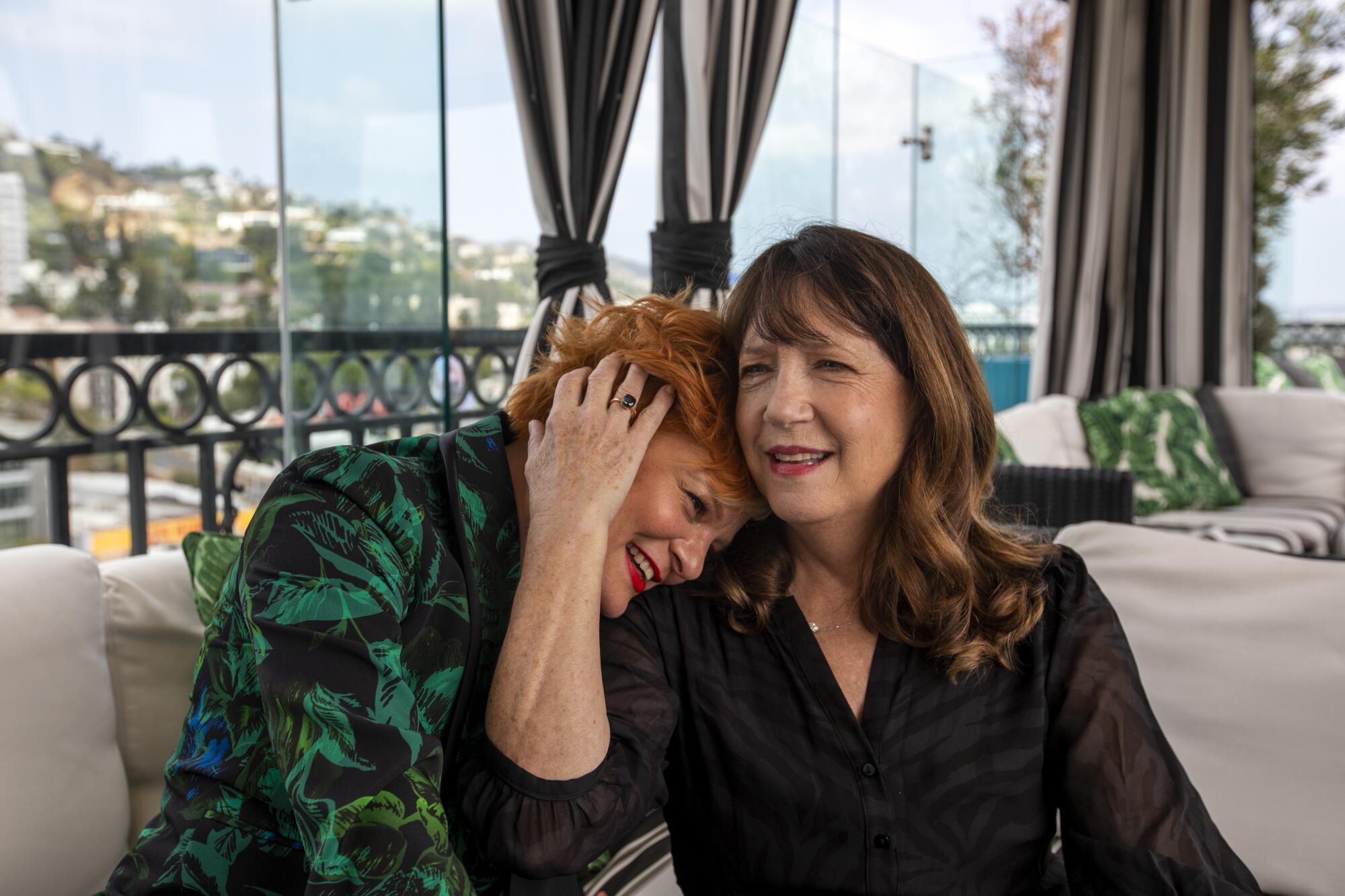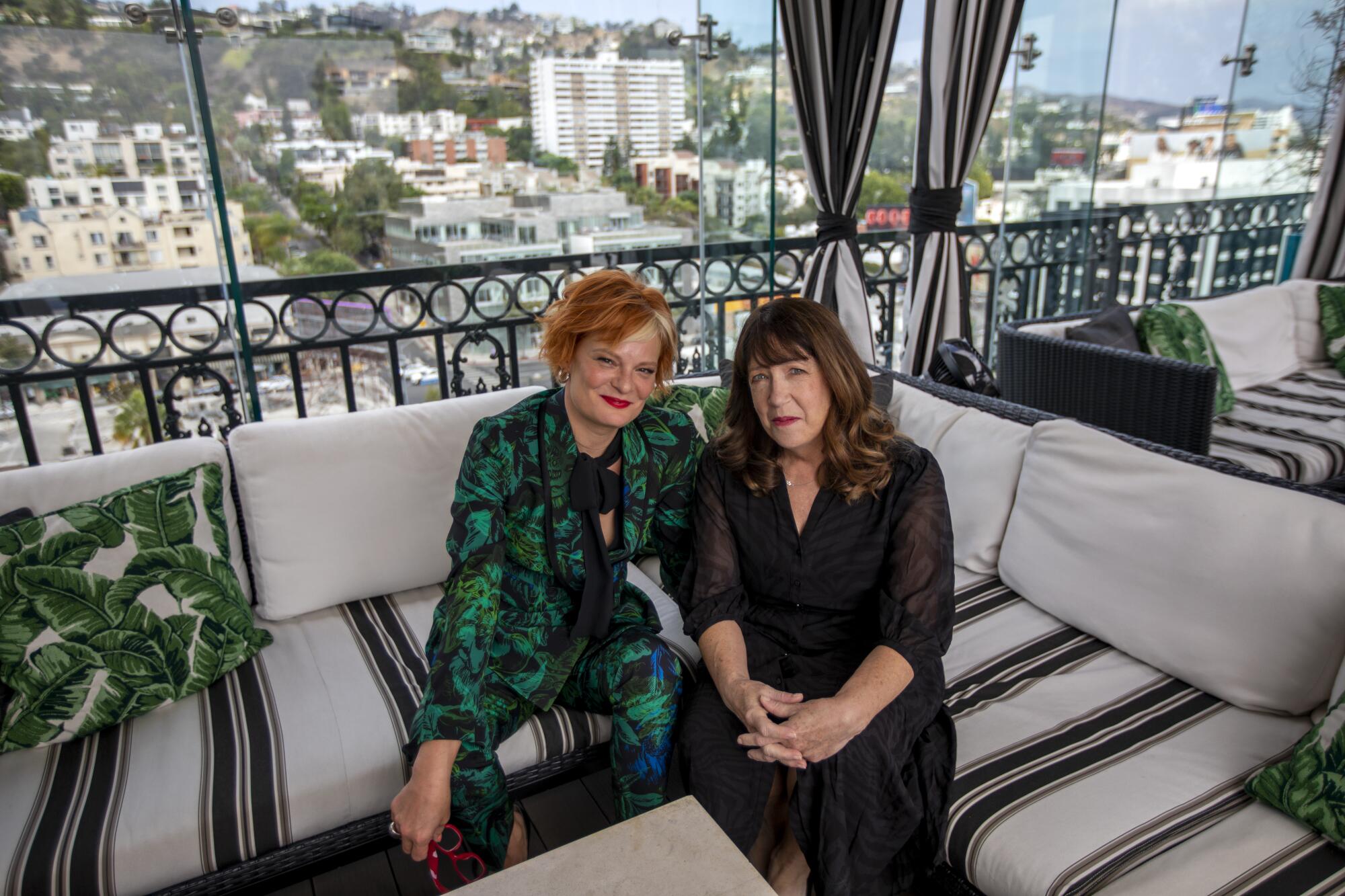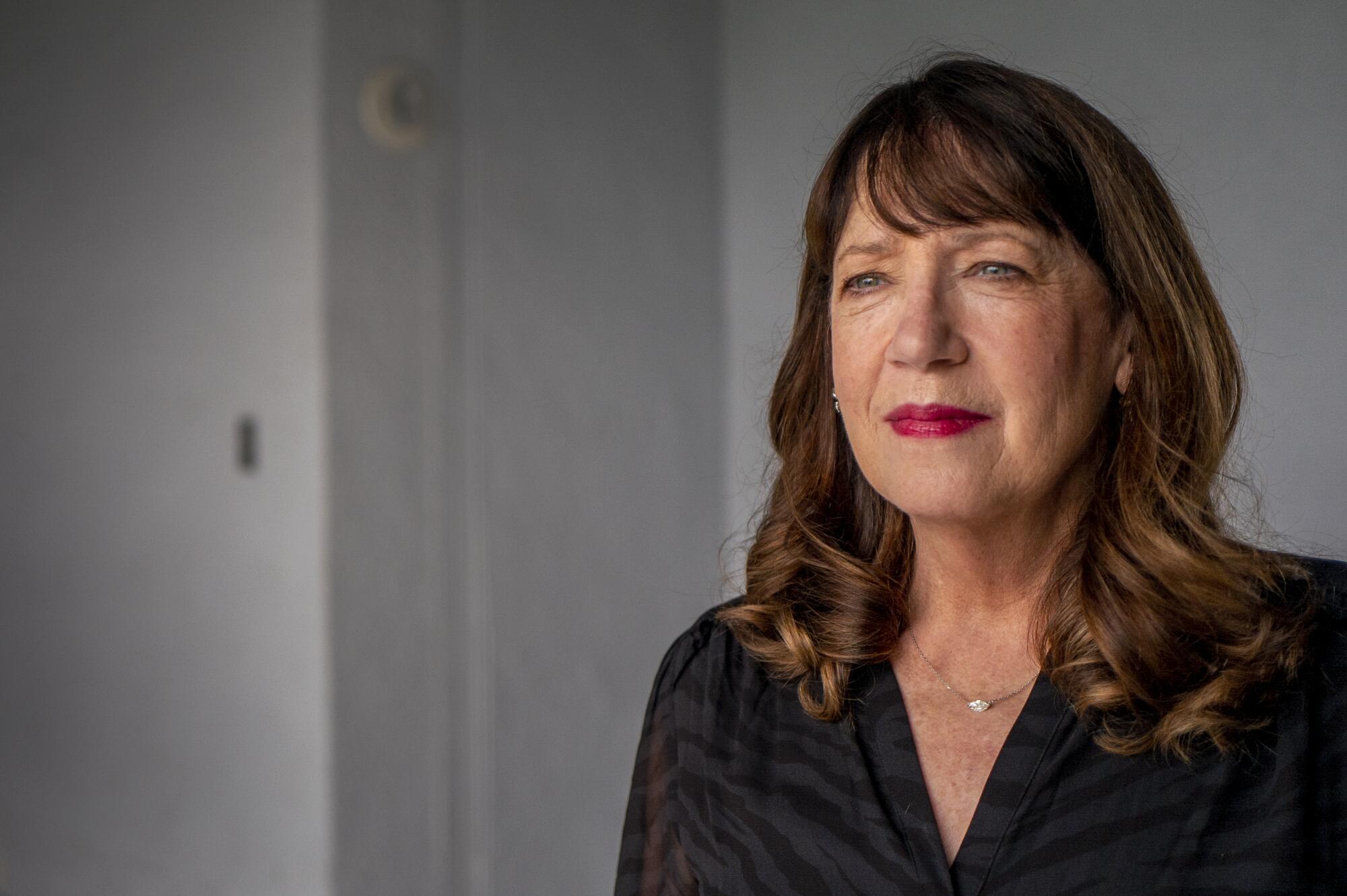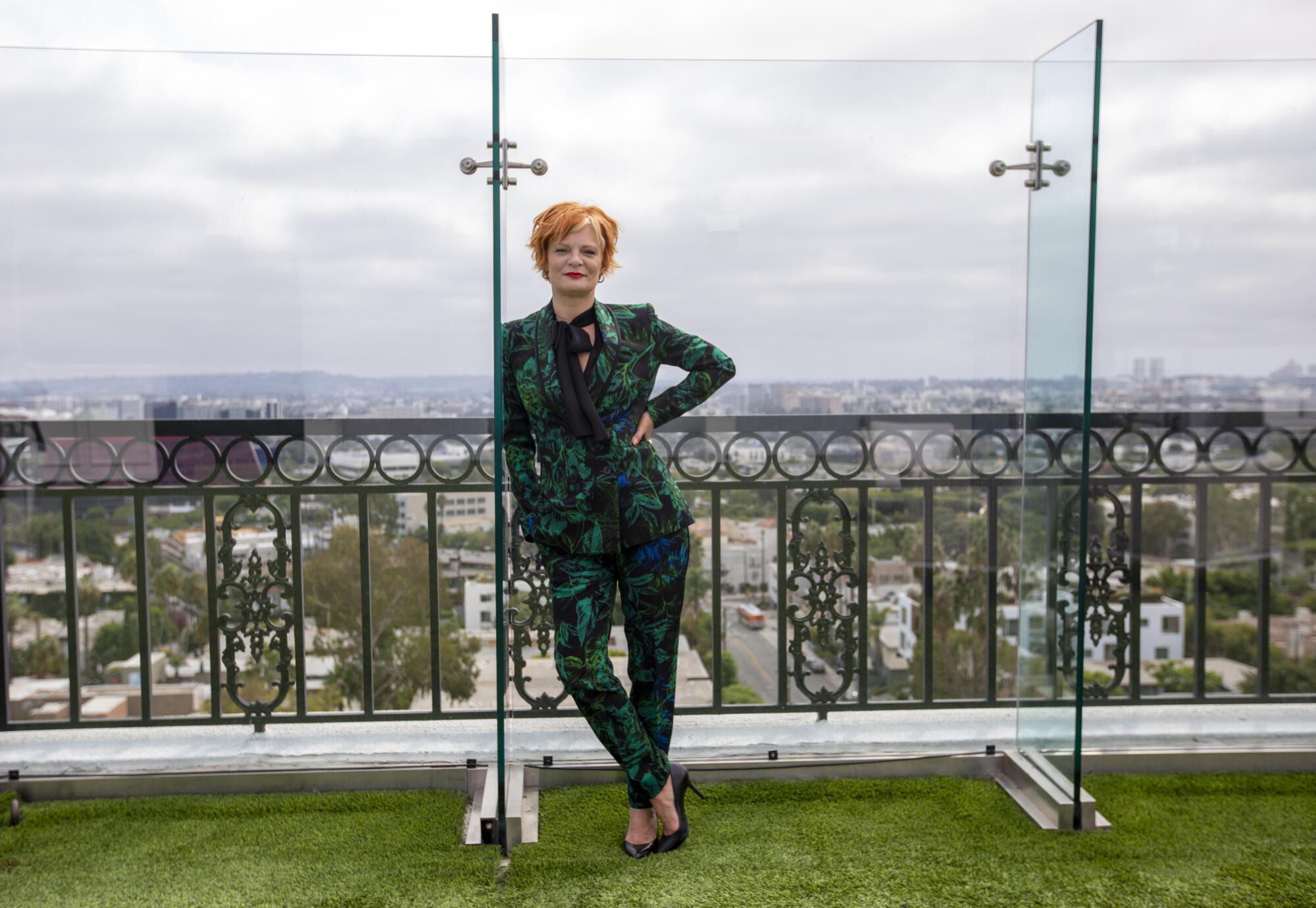
- Share via
Four grief-stricken parents congregate in a quiet room within a humble church to summon a form of closure. They’re all still nursing unhealed wounds years after an unspeakable school shooting. Two of them mourn their slain teenager, while the other pair grieve the death of the perpetrator. Unguarded in the privacy of this space, with no legal liabilities preventing the disclosure of their individual truths, a sorrowful dialogue unfolds.
This is “Mass,” an astutely titled chamber piece from first-time director Fran Kranz (also an actor of both the screen and the stage) charged with the magnitude of immeasurable loss and the nearly unfathomable resilience needed to sit across from the people on the seemingly opposite side of the tragedy.
The picture, which begins its theatrical rollout Friday after a world premiere at January’s Sundance Film Festival, derives its devastating impact from Kranz’s deftly balanced screenplay melding with a remarkable quartet of thespians at their peak.
Emmy winner Ann Dowd personifies Linda, who gave birth to and raised the individual responsible for multiple casualties, and Martha Plimpton is Gail, a woman who did the same for one of the innocents who perished: mothers on contrary ends of an atrocious occurrence. Reed Birney as Richard and Jason Isaacs as Jay complete the ensemble, playing the spouses and fathers undergoing this watershed.
Kranz’s project, born out of his own preoccupations as a new parent shocked by the horrific 2018 shooting at Marjory Stoneman Douglas High School in Parkland, Fla., went through several transfigurations before its stars signed on. Initially, Kranz wrote it with cinema as the preferred medium. Knowing a high budget was unfeasible, he thought of pulling favors from actor friends in the New York theater community.
Superb, anguished performances by Jason Isaacs, Martha Plimpton, Reed Birney and Ann Dowd anchor Fran Kranz’s assured writing-directing debut.
However, a couple of months into the writing process, the work shifted into a stage play. Eventually, the concept turned back into a movie, but even then, Kranz was writing with theater actors in mind.
“When the script finally started getting circulated, and we got casting directors on board, that’s when it stopped just being an attachment I would send to people over email, begging them to read my screenplay,” Kranz said. “All of a sudden, I started getting interest from real talent agencies and their clients. I saw Martha Plimpton’s name on a list one day, and that was it. The role of Gail was never going to be anyone but her.”
As a kid, Kranz perceived Plimpton as a “real actor” capable of restrained performances. Credits such as “Running on Empty,” “Parenthood” and, of course, “The Goonies,” seared that impression. “Mass” provided an opportunity for him to witness her work first-hand.
For Plimpton, conscious of the financial limitations facing a storyteller in his first foray behind the camera, the decision to join came down to the script and the warm seriousness Kranz projected. “I read it and I finished it, which is pretty rare for me. I was really blown away. It was like this sort of avalanche, like a mighty snowy stone falling down a hill with momentum,” Plimpton said. “I felt the pace of the movie. I heard the rhythm of it. I found the dialogue totally organic.”
The actress marveled at the script’s nuance. Kranz spent three years intensely studying the realities of families who’d experienced similar horrors and how they’d moved forward. The material was enough for Plimpton to understand her character’s psychological landscape and deterred her from replicating a specific person’s journey.
“I didn’t feel it would be right to try to approximate any one person’s story or to personalize it in that way. I didn’t feel like there would be any way for me to conceive of this any better by reading about it,” said Plimpton. “I just thought, ‘I’ve just got to go through this experience in the room with these actors. That’s the only way to do this. No amount of research will help with this.’”
In Kranz’s mind, Gail is the spiritual protagonist of the film — she has a clear objective but doesn’t know how to achieve it. That made it more straightforward for him to visualize Plimpton as the heroine.
Conversely, Dowd came on board later. Even though there were performers interested in the part, Kranz had difficulty envisioning who could play Linda. “There’s such a spiritual journey that Linda’s on in order to find value in herself and her life again, and reclaim her identity as a mother. I struggled to find an actor to visualize in the role,” said Kranz.
It wasn’t until the other three characters had been cast and the location in Sun Valley, Idaho, had been secured that Linda started to come into focus. It was an “aha moment.”
When Dowd read the script, she had two thoughts: “How could you ever turn this down, and how can you live in this level of grief for that period of time?” She knew she wanted to be involved, and read “A Mother’s Reckoning: Living in the Aftermath of Tragedy,” a book by Sue Klebold, mother to one of the assailants in the 1999 Columbine High School massacre in Colorado.
“Reading about a mother who did not see it coming was very helpful to get that perspective, as I think Linda just didn’t see it,” said Dowd, visibly emotional. “And as a mother, to both lose a child, which is unthinkable, but also to know he caused the death of many others, I can’t imagine a more challenging break in one’s life. I don’t think Linda ever expects to heal. She just laid there in that broken state and accepted it as the truth. She didn’t push the grief away and gradually began to talk to whomever she could about where she is.”
By the time her character, Linda, walks into this encounter, after having arduously worked on herself, there isn’t a defensive bone in her body, Dowd believes. “She’s very honest with herself about the fact that this may not do anything for anybody, but still goes in with an open heart with the awareness that it was done in hope,” the actor added.
Exploring the subject of a mass shooting, even when it’s not depicted on screen, naturally leads to the issue of gun control. Dowd says she’s baffled by the segments of society that refuse to acknowledge the deadly problem. She points to Australia, for instance, as a nation that imposed strict gun control measures in the aftermath of a 1996 mass shooting.
“I do not understand the obsession with guns that this country has. The evidence is everywhere that we’ve made a mistake. Why anyone needs an automatic weapon, you can’t convince me,” Dowd said. “When guns are in the hands of the wrong people, of kids, troubled people, angry people who haven’t gotten or been able to get help, that’s a disaster for everybody. What does it take? I don’t know the answer.”

Still, if “Mass” had been a polemic or politically minded, Plimpton says, it’s unlikely it would have garnered as much interest from those involved. “Everything is told through the dialogue and the interactions of our bodies and the way we look at or don’t look at each other, in our silences or in our interruptions,“ she said.
There are no flashbacks to the fateful happening or inserts of the family photographs the parents share with each other, as to not deviate the spotlight from their intimate discourse. No mask, no distractions, just intentional, communal feeling.
“Mass” was filmed in just 14 days. Four of those days were for the scenes set outside the meeting room — the beginning and end of the movie — and eight were spent on the four-person meeting, from beginning to end. Once inside the room, the production worked in sequence with two cameras, to get shots from various angles, which helps maintain the flow of the exchanges without constantly cutting. And since the scenes had to unfold during the day, filming ended in the early evening, giving the actors time to engage with one another each night.
Rehearsal time was minimal; the production could afford only 2½ days of preparation. Hoping to maximize the cast’s short bonding period, Kranz used a technique he learned while working for the late director Mike Nichols on a Broadway production of “Death of a Salesman.” He made himself vulnerable by sharing everything about himself with cast members. Dowd chimed in with a story of her own, and like dominoes, the other three cast members shared disappointments and triumphs.

Dowd said she is often asked about the difficulty of getting to a harsh state of mind or letting go of those sentiments after she wraps, especially in relation to her Emmy-winning role as Aunt Lydia on Hulu’s “The Handmaid’s Tale.”
“Acting isn’t about suffering, you know. It doesn’t serve the character or the piece. It’s something else that happens that allows you to live in that space, honestly, and that happened for all of us,” she said. “We trusted one another. We had laughing sessions. And then we were able to go back to the place where we knew we needed to be.”
Kranz believes the women portrayed in his film are seeking a shared humanity on their path toward forgiveness. In comparison to the fathers, whose approach is to label and rationalize what occurred, Gail and Linda are more attuned to the spiritual and the inexplicable. Their gestures toward each other go beyond mere absolution — neither a definitive gift nor the ultimate olive branch of empathy.
“This notion of forgiveness is all well and good, but if we can accept and appreciate the shared humanity in one another through shared suffering, forgiveness becomes almost irrelevant, because frankly, there is a transactional element to forgiveness,” said Kranz. “But if we can relate on some deeper human level we might not need that. We might be able to reach commonality and peace just through making the effort to have that connection.”

On granting someone spiritual atonement, the kind that Linda seeks without asking for it, Dowd argues that it can take hold only if it’s both given and received in honesty. “When you come to understand a person’s situation, and the wall drops because we understand each other on a heart-and-soul level, then you just don’t carry that rage anymore. That’s when forgiveness will take care of itself,” she said. “We finally drop the armor, listen without judgment and arrive at the depth of a human being without all the anger. But it means two people have to do that in order for it to work.”
At the same time, for Gail, terrified that she’ll lose her son forever if she lets go, the excruciating agony and fury against those deemed culpable for her disgrace offers a strange comfort. Thus getting herself to the point of looking Linda in the eye and uttering a monumental sentence of clemency represents a debilitating undertaking.
“Forgiveness can’t be an abstraction. It isn’t just like a religious thing. It’s not like believing in God or believing in miracles,” said Plimpton. “It’s not something that just can be decided upon. It’s a process, and it has empirical value and objective value that in the process of it is where one finds a sense of grace, a sense of calm or peace, or at least a sense of the absence of desire for the thing to be different. Like a practice, like meditation, it’s a daily decision.”
More to Read
Only good movies
Get the Indie Focus newsletter, Mark Olsen's weekly guide to the world of cinema.
You may occasionally receive promotional content from the Los Angeles Times.










